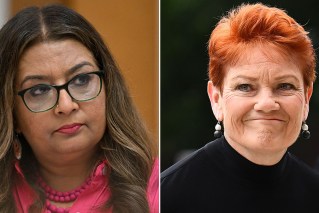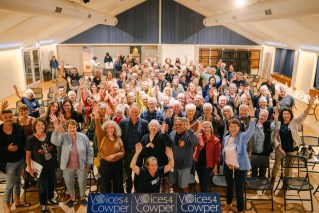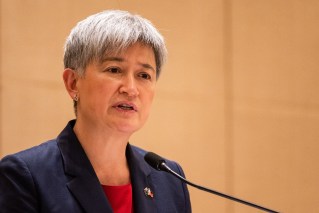AEC ticks off Yes campaign over ‘misleading’ ads
The Yes campaign for the Indigenous Voice has been ticked off over a “disappointing” social media post that might have led to “confusion” in voting in this month’s referendum.
It is the second time this week the Australian Electoral Commission has taken the pro-Voice campaign to task, following a dispute over signs outside early polling centres that used the same shade of purple as the AEC’s official branding.
The commission said on Monday the signs could mislead voters about the source of their message.
“When we were alerted to this signage, the AEC requested the Yes23 campaign to rectify the situation by ensuring their signs are not placed in the proximity of AEC voting centre signs,” it said.
“The Yes23 campaign has agreed to comply with this request.”
Tweet from @CliveFPalmer
On Wednesday, the AEC took issue with a Yes campaign infographic posted to social media that used a cross to illustrate the argument that voting no in the referendum would bring the “same old failures”. It said voting yes would mean “better results”, and illustrated that with a tick.
The infographic also repeated the use of the AEC’s purple branding.
It follows controversy over crosses and ticks throughout the referendum campaign – including a failed court bid by United Australia Party senator Ralph Babet and the party’s chairman, mining magnate Clive Palmer to have ballot papers containing a cross or ‘X’ marking to be counted as a vote against the Voice.
“We understand the instructions to ‘vote no’ or ‘vote yes’ is in your graphic,” the AEC said in a post replying to the Yes campaign.
“However, given the public discussion and court matters re ticks/crosses it is disappointing they feature prominently in this graphic. Requesting immediate removal to limit any potential confusion.”
The post has since been deleted.

The controversial social media post has since been deleted. Image: Yes23
The controversy came as more than 500,000 Australians have already turned out to vote on the Voice, with early polling centres opening across the country this week.
On Tuesday, polling found support for the Indigenous Voice referendum had ticked up for the first time in months, but still lagged behind the No vote.
The latest Guardian Essential poll found 43 per cent of its 1125 respondents would vote yes, up 2 per cent from last fortnight. But 49 per cent intended to vote no and 8 per cent were undecided.
Against this backdrop, a concerted effort is being made to engage Australia’s multicultural communities in the referendum.
However, some have reported little to no engagement from either side of the campaign.
The Sydney Alliance, which is made up of more than 40 civil society organisations, is translating referendum material into migrant languages in the city’s west, explaining how to vote.
The alliance was also tapping into the feelings of disempowerment to explain why an Indigenous advisory body was needed in the constitution, Chantelle Ogilvie-Ellis said.
The feedback from the Yes campaign on the ground in Western Sydney was relatively positive, she said.
“There’s not a lot of acknowledgement of the history of Indigenous people in Australia, so a lot of our conversations are filling in that background,” Ogilvie-Ellis said.
Common themes of support and not feeling heard made migrants receptive to the message, she said.
The Yes23 campaign captain in the outer Melbourne electorate of Lalor said the multicultural community in Victoria’s capital was equally receptive.
The main question from migrant and refugee communities was why such a measure hadn’t already been implemented and First Nations recognised, Emma Moxom said.
“They understand what Indigenous people have been through and they’ve been through things quite similar,” she said.
“Our multicultural community is very open-minded to this message.”
But some second-generation European migrants in inner-city Sydney suburbs, who did not want to be quoted, said they had received almost no engagement from either side outside a letterbox drop.
A number remained sceptical about what the Voice could achieve when countless other programs had failed.
Prominent Indigenous No campaigners Warren Mundine and Senator Jacinta Nampijinpa Price have called the Voice divisive and said it would split Australia down racial lines.
“It doesn’t matter whether we were here 60,000 years ago, or six months ago, you are Australian … and the problem with this divisive referendum is the fact that it seeks to create different levels of citizenship,” Price said.
https://www.instagram.com/p/Cx6zYSfhyxo/
It is this messaging that Desis for Yes – a South Asian-Australian run campaign – is seeking to counter.
Underlying questions from the South Asian community mainly related to whether the Voice would make binding decisions or offer special treatment, co-founder Nish Rajo said.
“It’s really easy to spread messages like, ‘if you vote this through, people will take your land away or you’re giving special rights to a particular group of people’,” he said.
“This is an advisory body, it’s not a decision-making body. That is why we are working so hard to spread the right information.”
Australians head to the ballot box on October 14.
– with AAP








